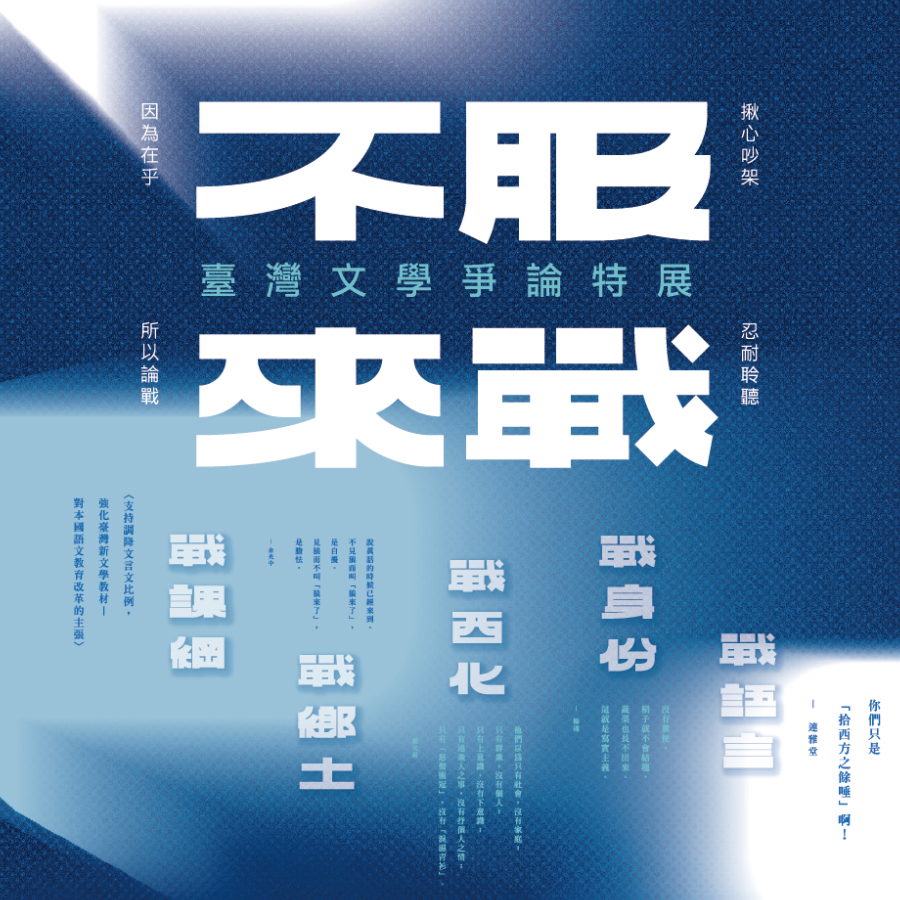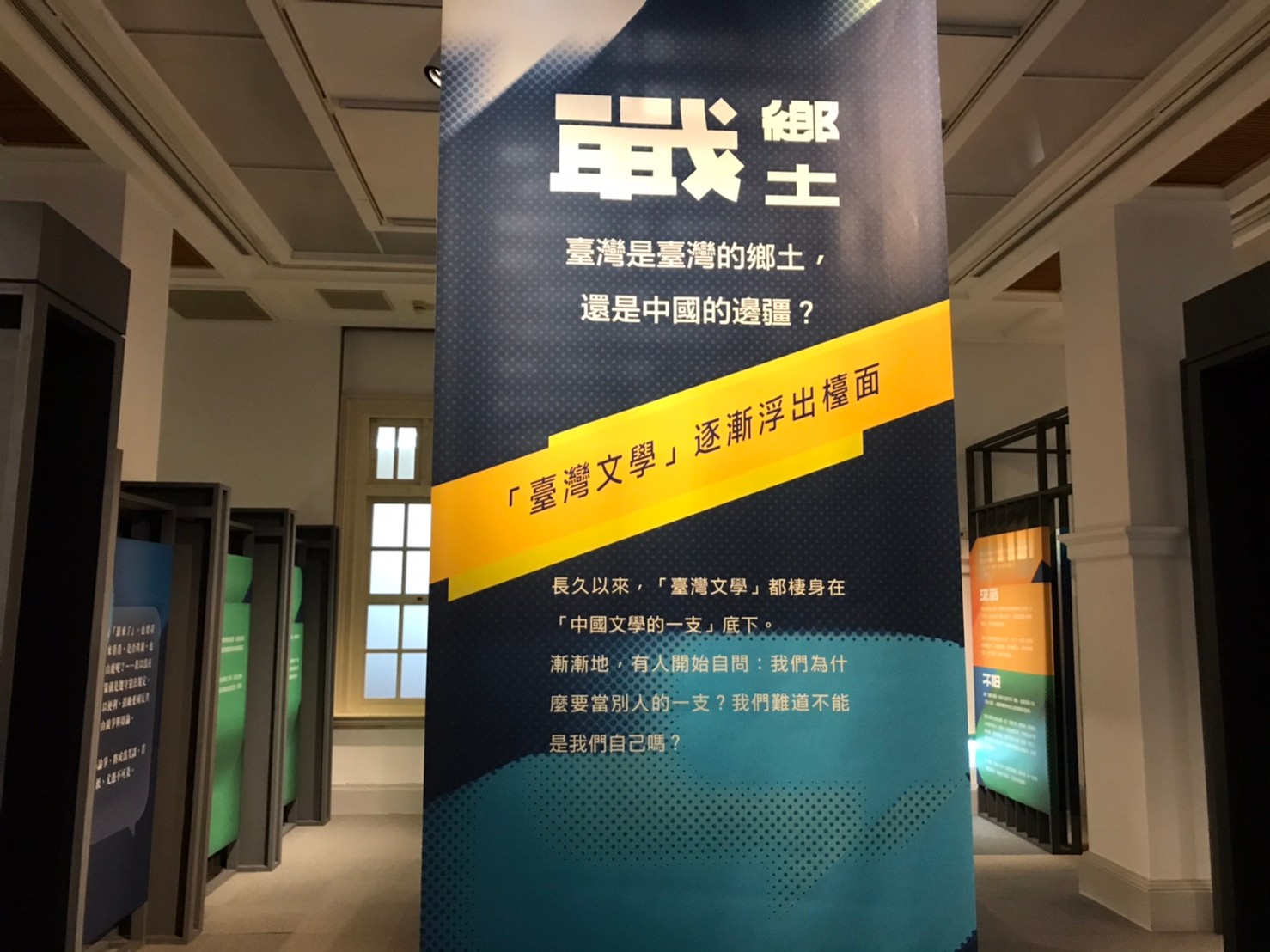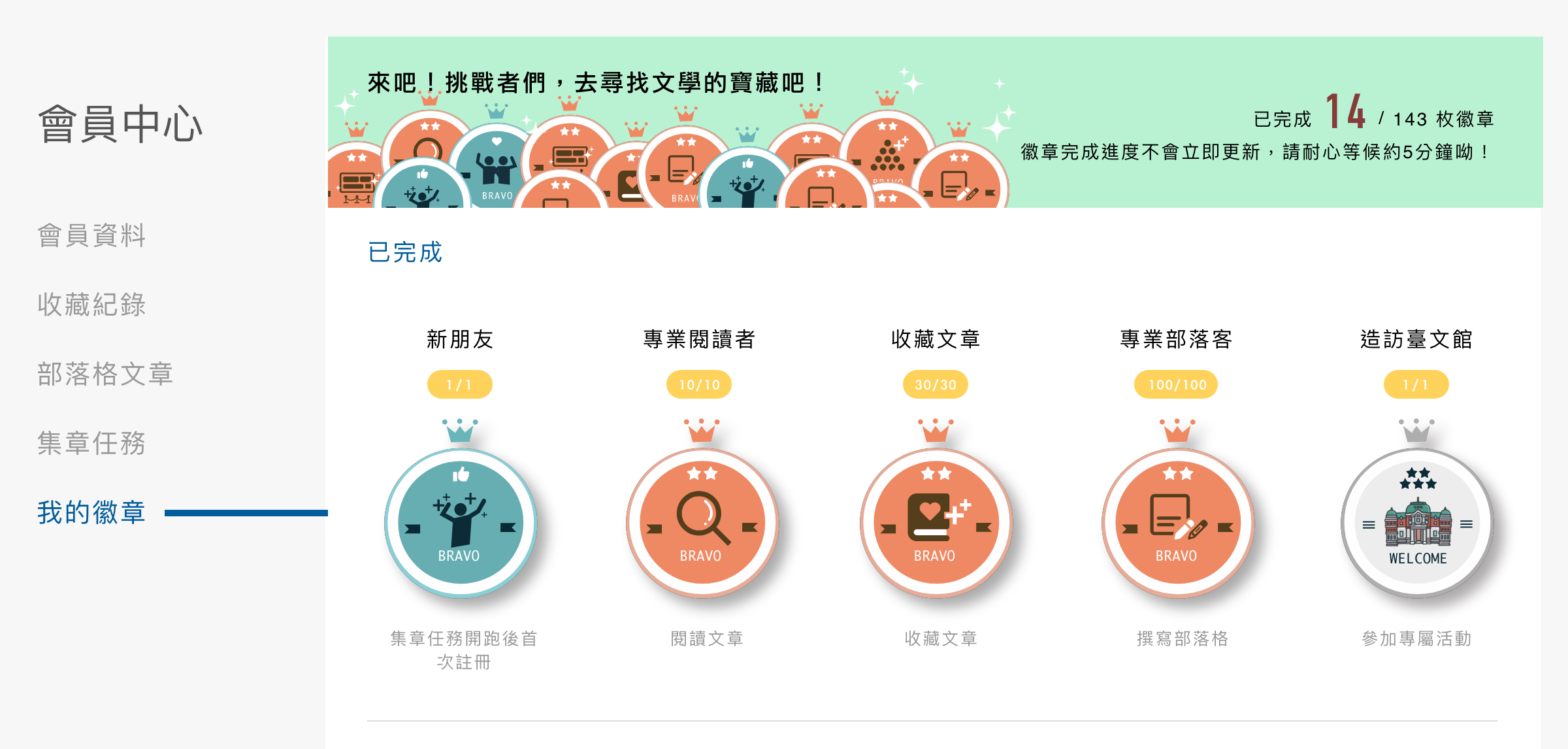Emergence of "Taiwanese Literature"
For a long time, "Taiwanese Literature" had been subordinated to "Chinese literature". Gradually, people started to question why Taiwanese literature had to be a branch of something else. Could we be ourselves?
【The Main Argument】
In the long martial law period, the term "Taiwanese literature" was once taboo. Whoever declared its independence would be politically suppressed. The "debate on nativist literature" in the 1970s began from "whether literature should involve reality" and also accidentally sparked the arguments over the essence of Taiwanese literature, which resulted in the subsequent "debate on marginal literature" and "debate on Taiwanese identity." What exactly could Taiwanese literature be? What was its relation with China? These questions had been once vigorously discussed but unsolved during "the Supplement Qiao Debate," and finally they resurfaced between the 1970s and 1980s and became the focus of arguments in the literary scene.
◎ 1977-1978 Nativist Literature Debate: The grand battle of "left, right, unity, and independence"
During the martial law period, the pro-government writers were mainly divided into two camps: "anti-communist literature" and "modernism." The two camps had very different literary views. Yet, they showed the same hostility to "nativist literature" that dealt with realistic Taiwanese society. The anti-communist literature camp was not fond of "writing about Taiwan," whereas the modernism camp disliked "writing about reality." Therefore, the two found common ground and jointly attacked the burgeoning "nativist literature" in the 1970s, leading to the "debate on nativist literature."
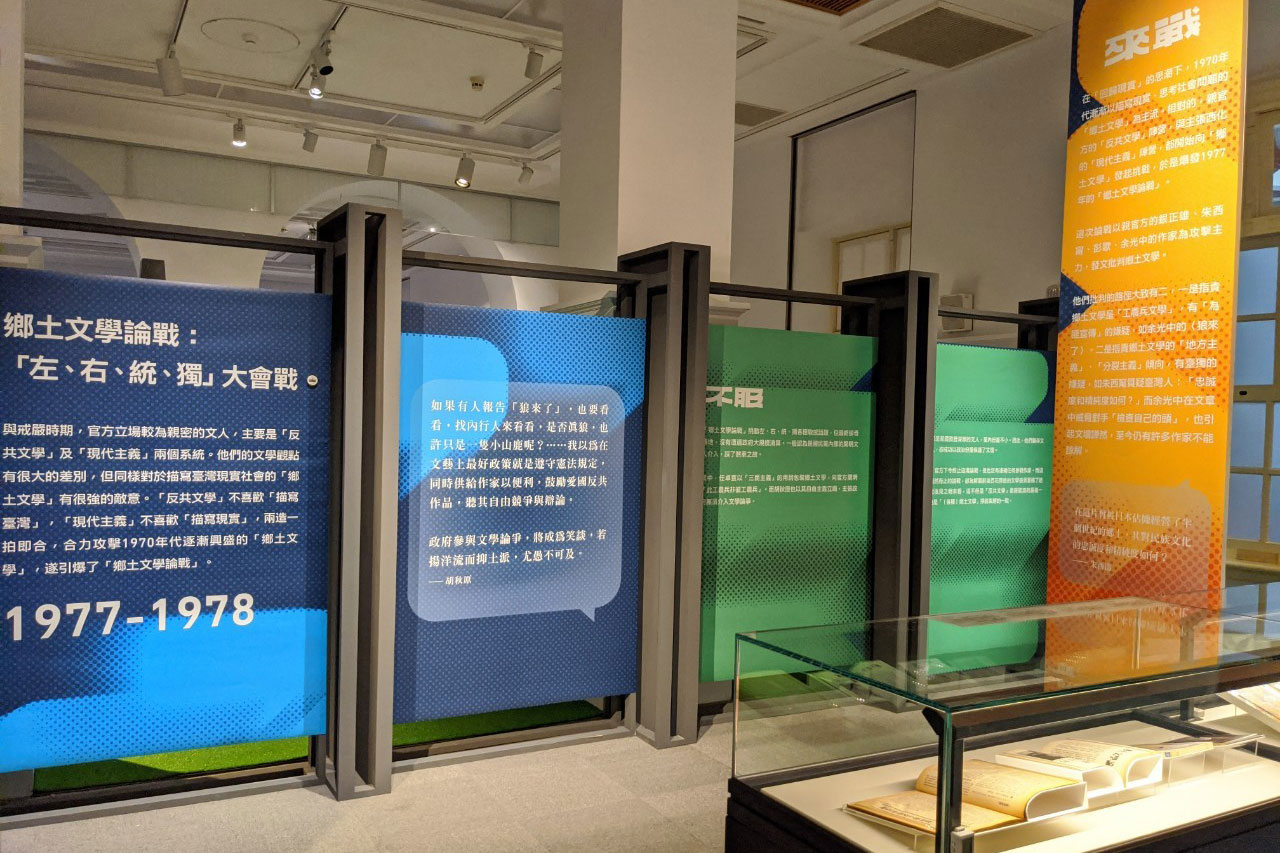
.png) Hsi-Ning Chu: On the land that has been occupied by Japan for half a century, how loyal can the people be to their nationality and culture?
Hsi-Ning Chu: On the land that has been occupied by Japan for half a century, how loyal can the people be to their nationality and culture? .png) Kwang-Chung Yu: It is time to tell the truth. Those who cried wolf without seeing a wolf are only causing trouble to themselves. However, those who don't cry wolf when seeing a wolf are cowardly. When something or someone is attached with a label, the point is not really the label, but the thing or person. If the label is correct, then it is not false labelling but an accurate description. Before complaining about false labelling, those categorized as writers writing for "Worker-Peasant-Soldier Literature" should reflect on themselves first.
Kwang-Chung Yu: It is time to tell the truth. Those who cried wolf without seeing a wolf are only causing trouble to themselves. However, those who don't cry wolf when seeing a wolf are cowardly. When something or someone is attached with a label, the point is not really the label, but the thing or person. If the label is correct, then it is not false labelling but an accurate description. Before complaining about false labelling, those categorized as writers writing for "Worker-Peasant-Soldier Literature" should reflect on themselves first.Amid the trend of "returning to reality," the mainstream in the 1970s came to center on "nativist literature", reality and social problems. In contrast, the camp that was pro-government and "anti-communist" began to challenge "nativist literature," together with the modernist camp that proposed westernization. Consequently, the debate over nativist literature erupted in 1977.
The main participants of this debate included Cheng-Hsiung Yin, Hsi-Ning Chu, Ge Peng, and Kwang-Chung Yu, who supported the Nationalist Party and published articles criticizing nativist literature.
Their attacks consisted of two types of criticism: One was the criticism that nativist literature was "Worker-Peasant-Soldier Literature" and was suspected of "promoting communism." Kwang-Chung Yu's "Wolf's Coming" was an example. The other was the criticism that nativist literature, under suspicion of Taiwan independence, had the inclination for "localism" and "separatism." For example, Hsi-Ning Chu questioned Taiwanese people's loyalty. Kwang-Chung Yu asked the opponents to reflect on themselves, triggering commotion in the literary scene. Even now, many writers still cannot forgive these attacks.
Although "the debate over nativist literature" was essentially a literary debate, it was actually a political and social debate as well. It was a question of "whether to write about nativism" and "what nativism is." The underlying political interrogation was to probe if there was any anti-government sentiment. At the time, a menacing political storm moved straight toward the literary world.
 Shih-Tao Yeh: Although our nativist literature isrestricted neither by skin color nor by language, there must be a prerequisite for Taiwan's nativist literature; that is, Taiwan's nativist literature must be works written with Taiwan at the center. In other words, Taiwanese literature should be seen in the world's literature from Taiwan's perspective.
Shih-Tao Yeh: Although our nativist literature isrestricted neither by skin color nor by language, there must be a prerequisite for Taiwan's nativist literature; that is, Taiwan's nativist literature must be works written with Taiwan at the center. In other words, Taiwanese literature should be seen in the world's literature from Taiwan's perspective. At the beginning of the debate, Yeh published "Introduction to History of Nativist Literature in Taiwan." Yeh represented the nativist camp; however, due to the suppressive political atmosphere, the nativist writers could not openly support Taiwan's Independence.
Yeh's article wrote about "nativist literature" with ideas such as "Taiwanese identity", "Taiwan as center" and "Taiwanese perspective." In such stance, "nativist" was "Taiwan," and naturally the notion of "nativist literature" was "Taiwanese literature." Though the concept was rather circuitous, it was already an adventurous step forward during the martial law period.
Overall, the nativist camp was more low-profile in the "nativist literature debate," and their publications were fewer. However, this article by Yeh was pioneering and predicted the rise of Taiwanese literature in the 1980s and 1990s.
 Tian-Cong Wei: We care and write about our own reality. This is exactly what nativist literature is about. At the core of his claim is localism that is anti-comprador, against worship of foreign powers, and opposed to separatism.
Tian-Cong Wei: We care and write about our own reality. This is exactly what nativist literature is about. At the core of his claim is localism that is anti-comprador, against worship of foreign powers, and opposed to separatism.The nativist writers, including Tuoh Wang, Ying-Zhen Chen, and Tian-Cong Wei, were attacked by the pro-government writers the most. This group of writers more or less belonged to the left political spectrum. Thus, as the pro-government writers tried to smear them with the communist label, they were under the most pressure.
Only two years after his release from jail as a political prisoner, Ying-Zhen Chen took the risk of standing at the frontline. He refuted the viewpoints of pro-government writers, such as Kwang-Chung Yu and Ge Peng, with his "Building a Style of Ethnic Literature" and advocated the return to reality and opposition to westernization. Meanwhile, he rebutted Shih-Tao Yeh with his "Blind Spots of'Nativist Literature'" and was opposed to Yeh's idea of "Taiwanese literature."
This was the reason why the debate over nativist literature was so complicated. Though on the surface, it was a debate where "the pro-government writers attacked the nativist writers", the reality was that these nativist writers also had their own viewpoints. When confronting the official right-wing viewpoints, the left jointly supported "nativist literature." Nonetheless, when it came to what kind of nativism it was, the left-wing writers were divided into two groups respectively led by "pro-unity" Ying-Zhen Chen and "pro-independence" Shih-Tao Yeh.
 Qiu-Yuan Hu: If someone cries wolf, it must be investigated. Let an expert do that and see if it is a real wolf. What if it is a small mountain deer? …… I think the best literary policy is to comply with the Constitution and provide convenience for writers. We should encourage them to write patriotic and anti-communist works and allow them to compete and debate freely. It will be a joke if the government is involved in a literary debate. It is even more absurd to simulate western trends and suppress localism.
Qiu-Yuan Hu: If someone cries wolf, it must be investigated. Let an expert do that and see if it is a real wolf. What if it is a small mountain deer? …… I think the best literary policy is to comply with the Constitution and provide convenience for writers. We should encourage them to write patriotic and anti-communist works and allow them to compete and debate freely. It will be a joke if the government is involved in a literary debate. It is even more absurd to simulate western trends and suppress localism.The nativist literature debate triggered all types of sensitive topics concerning the left, right, unification with mainland China, and Taiwan's independence. However, the debate miraculously was not harmed by any big-scale political retaliation by the government. It was said that the more liberal writers from KMT (the Nationalist Party) helped prevent that from happening.
For instance, Cho-Hsuan Jen packaged nativist literature with Three Principles of the People and explained to the government that "this type of Worker-Peasant-Soldier Literature is different from that of communist China." Qiu-Yuan Hu also claimed that the government should not involve itself in a literary debate based on his views on liberalism.
These were all writers with ample experience in serving the KMT regime, and their status was high in the party. Thus, despite not being the most prominent literary figures, they successfully protected the literary scene with their power in politics.
Eventually, the government put an end to this debate without arresting any participating writers. This debate, seemingly ended abruptly, accumulating energy for the diversity in Taiwan's literary scene after the lifting of martial law. In hindsight, this was not just the last fight that completely broke "anti-communist literature," but also a fight against restrictions for various types of nativist literature.
-NMTL20140084760.jpg)
COLLECTED WORKS MONTHLY Issue 5, Vol. 2 (New Edition)
COLLECTED WORKS MONTHLY was an important literary magazine in the end of the 1950s. In the preliminary stage, it was released by Chinese Literature Association. Later on, the publication of the new edition was coordinated by Tian-Cong Wei. These two stages reflected the transition from the anti-communist literature in the 1950s to the modern literature in the 1960s. The new edition used famous western paintings as covers, introduced western cultural trends, and provided a platform for submissions of writing and criticism. The theme of Issue 5 of Vol. 2 was "Special Feature Dedicated to Literary Criticism." (Donated by Kui-Xian Li, Collection of National Museum of Taiwan Literature)
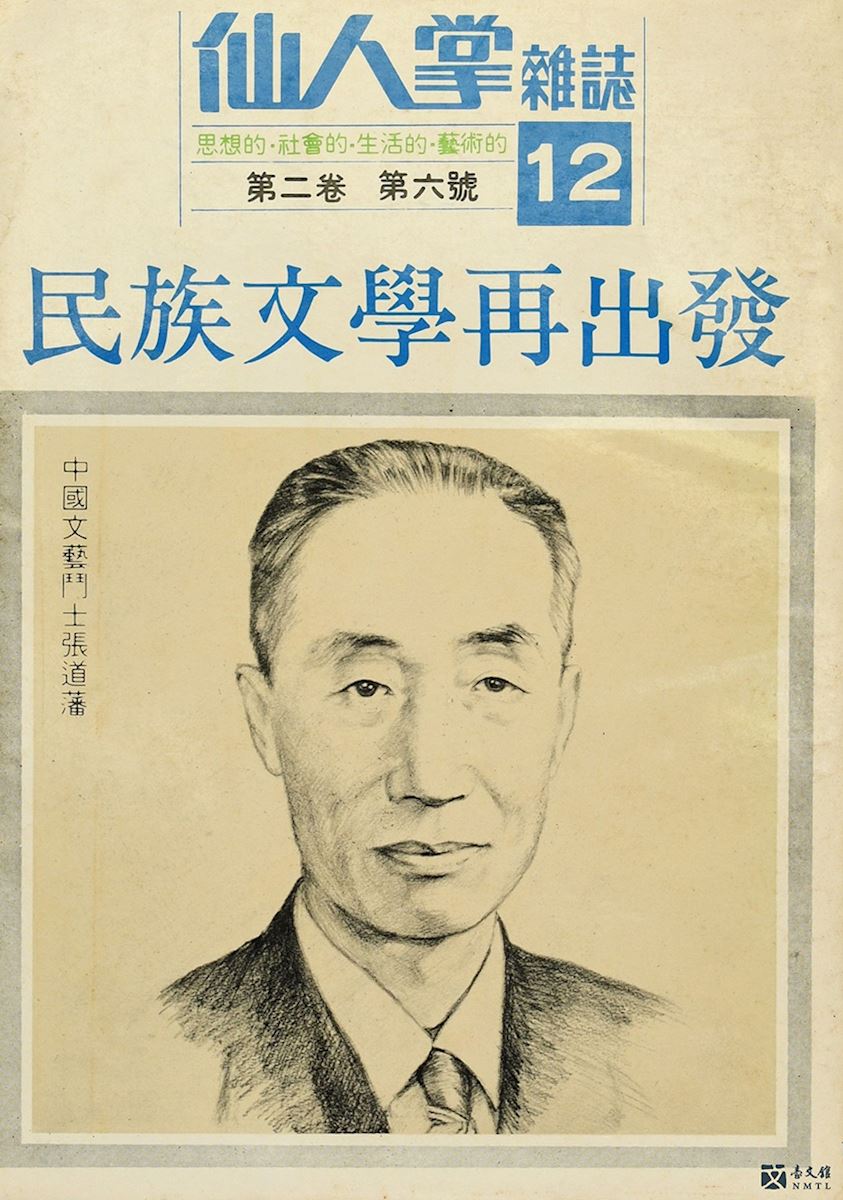
CACTUS MAGAZINE No. 6 of Vol. 2
In March 1977, CACTUS MAGAZINE was founded. With strong nationalism, the magazine acted as a forum that invited submissions of writers in relevant areas. The topics covered literature, human rights, rule of law, and society. As a result, it became the main stage for the debate over nativist literature in the 1970s. (Donated by Jin-Peng Lin's family, Collection of National Museum of Taiwan Literature)
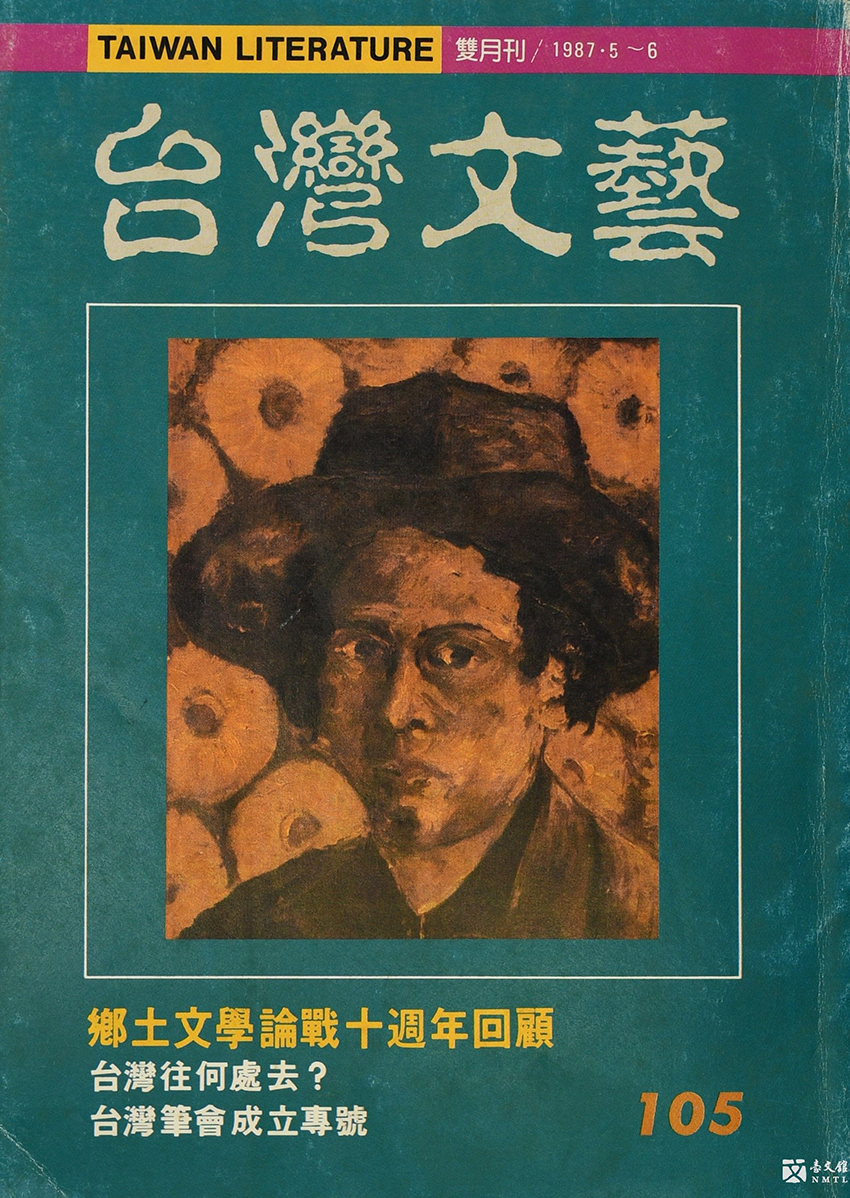
TAIWAN LITERATURE Issue 105
Founded by Wu Chuo-Liu in 1964, TAIWAN LITERATURE was an important magazine dedicated to nativist literature after the war. Apart from literature, its focus also extended to society and politics. It recorded 50 years of development of Taiwanese literature. In May 1987, Issue 105 was released; the publication was taken over by the Taipei Chinese PEN and coordinated by Ching-Chu Yang. The theme of the issue was "A Look Back on the Debate over Nativist Literature: Ten Years Later." In addition to reflecting on the development of realism in Taiwan's literary world after the war, it also paid attention to localism in art and the development of Taiwan's contemporary movies.(Donated by Yong-Fu Wu Taipei Cultural Foundation, Collection of National Museum of Taiwan Literature)
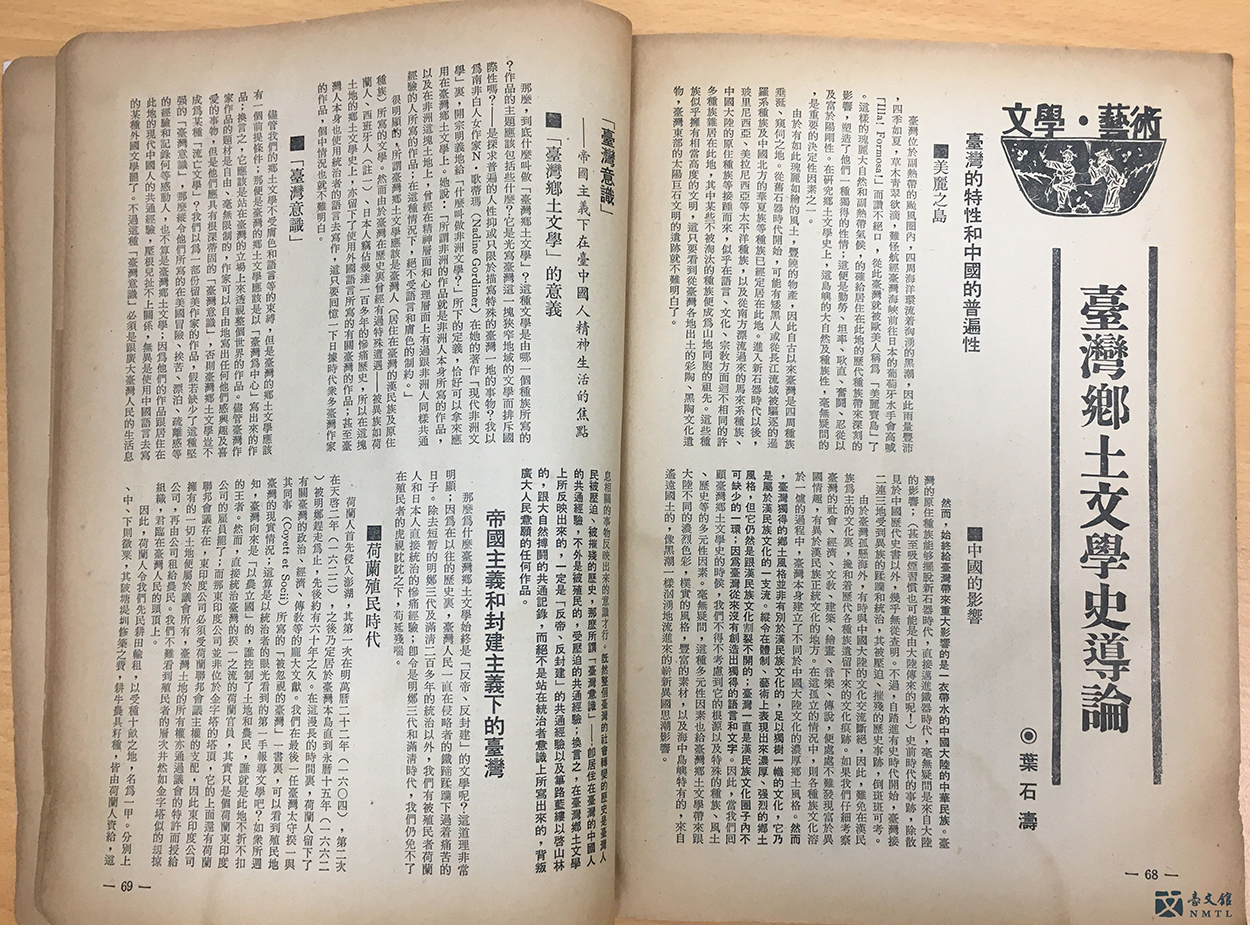
Shih-Tao Yeh, "Introduction to History of Nativist Literature in Taiwan" in SUMMER TIDE Issue 14
Yeh points out in this article that there should be a "Taiwanese identity" and Taiwan's nativist literature should "see through the world from Taiwan's point of view." This article marked a gigantic step towards progress for Taiwanese literature. (Collection of National Museum of Taiwan Literature)
NMTL20140086200.jpg)
NMTL20140086201.jpg)
NEW TAIWANESE LITERATURE Fall & Winter Edition 1997 (9); Spring & Summer Edition, 1998 (10)
New Taiwanese Literature was coordinated by Ze-Lai Song in 1995 and Shih-Hsun Wang was the publisher. The publication of the magazine was suspended in 2000. In total, 16 issues were released. NEW TAIWANESE LITERATURE was a magazine dedicated to nativist literature. Each issue featured literature reviews and literary works, aiming to cultivate young Taiwanese writers by accepting their submissions. In 1997 and 1998, the magazine focused on "The Second Wave of Nativist Literature Movement in Taiwan After the War" and reexamined the writers and their works since the nativist literature debate. (Donated by Kui-Xian Li, Collection of National Museum of Taiwan Literature)
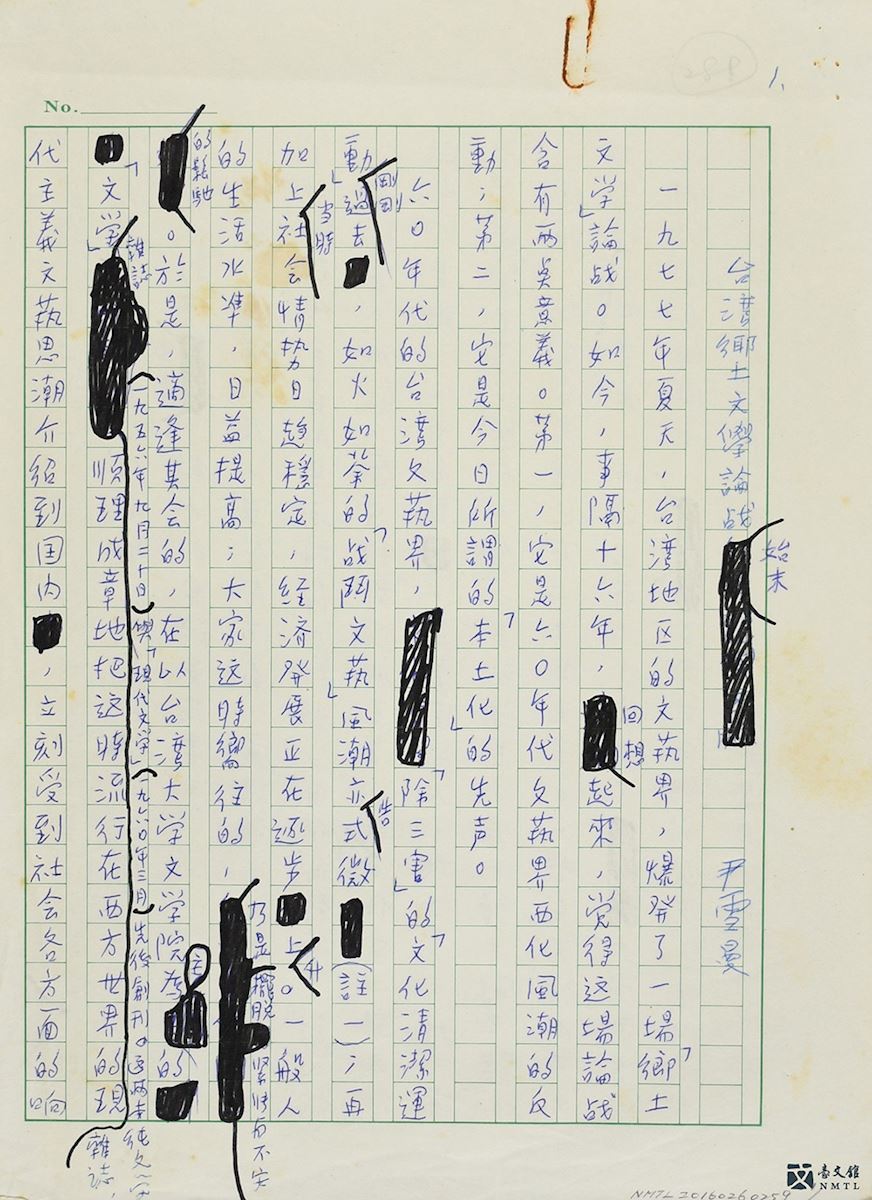
Xue-Man Yin, "Background of Taiwan's Nativist Literature Debate"
Xue-Man Yin (1918-2008) (real name: Guang-Rong Yin) was once in charge of coordinating HISTORY OF LITERATURE IN THE REPUBLIC OF CHINA. In the nativist literature debate, he represented the stance of the government. The article points out its two implications: One is the counter movement against the trend of westernization in the literary scene in the 1960s, while the other is the beginning of today's "localization." (Donated by He Fang, Collection of National Museum of Taiwan Literature)
◎ 1981 "Marginal Literature": Can Taiwan not be China?
In 1981, Hong-Zhi Zhan published an article about the winning pieces of United Daily News Award. The short preface of the article stirred up considerable controversy: "Is Taiwanese literature a kind of marginal literature of China?" In the 1980s, the nativist writers emerged and held strong views about Taiwanese subjective identity. The "marginal literature" argument faced tremendous opposition.
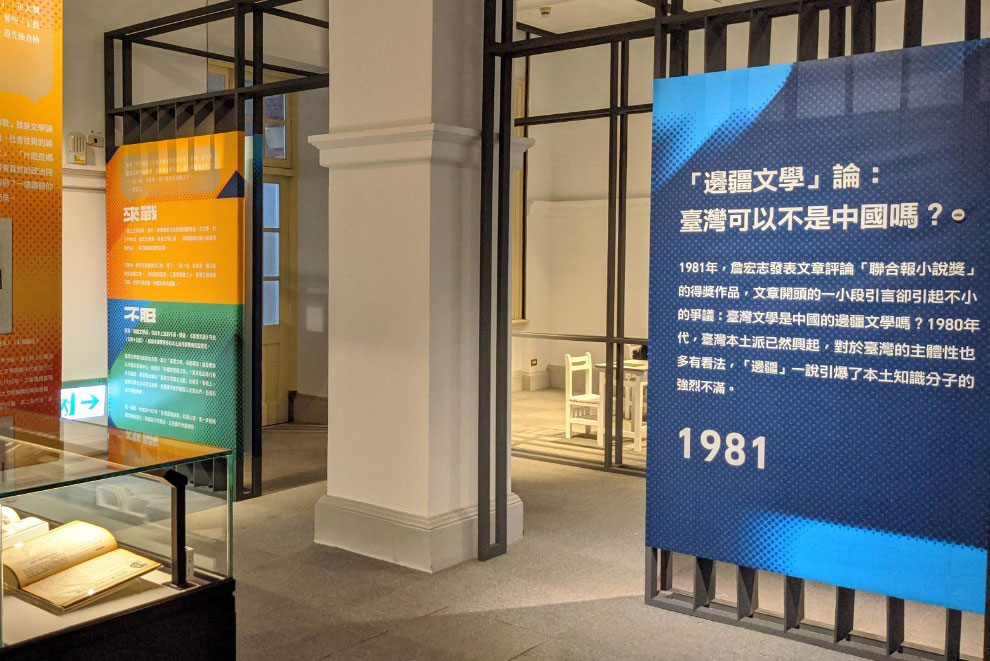
.png) Hong-Zhi Zhan: If someone is going to describe us over the past 30 years with 100 words in his writing on the history of Chinese Literature 300 years later, how would he describe us? Which names would be mentioned? ….... All this can only be counted as marginal literature in the future.
Hong-Zhi Zhan: If someone is going to describe us over the past 30 years with 100 words in his writing on the history of Chinese Literature 300 years later, how would he describe us? Which names would be mentioned? ….... All this can only be counted as marginal literature in the future.In the debate over nativist literature, the non-governmental camps already confronted one another several times over the issue of whether Taiwan should be independent from or unified with China. In 1981, Zhan published "Two Kinds of Literary Minds: A Review of Two Novels Granted with United Daily News Award," which once again sparked discussions over such issues.
From Dong-Nian's angle, Zhan wrote: "All this can only be counted as marginal literature in the future." He wrote in a pessimistic tone that the small size of Taiwan and the short history of Taiwanese literature would eventually make Taiwanese literature "the marginal territory of Chinese literature."

This statement about marginal literature was met with disapproval by the nativist writers. Later on, TAIWAN LITERATURE released "Literary Decameron," inviting many nativist writers, such as Ze-Lai Song, to submit their opposing viewpoints.
Should Taiwanese literature become an established genre with itself being the center? Otherwise should it evolve around Chinese literature and develop on the margins of Chinese literature? The two opposing sides engaged in more polemical exchanges on these questions. As a result, there was even a rumor concerning the split between southern and northern writers in Taiwanese literature. In fact, Taiwanese literature was never divided geographically. However, Taiwanese writers did form different factions based on their viewpoints as to whether Taiwan should be independent or not.
This debate triggered the "debate over Taiwanese identity" in 1983, magnifying the issue of Taiwanese independence. The atmosphere of the literary scene before the lifting of the martial law included enormous new challenges.
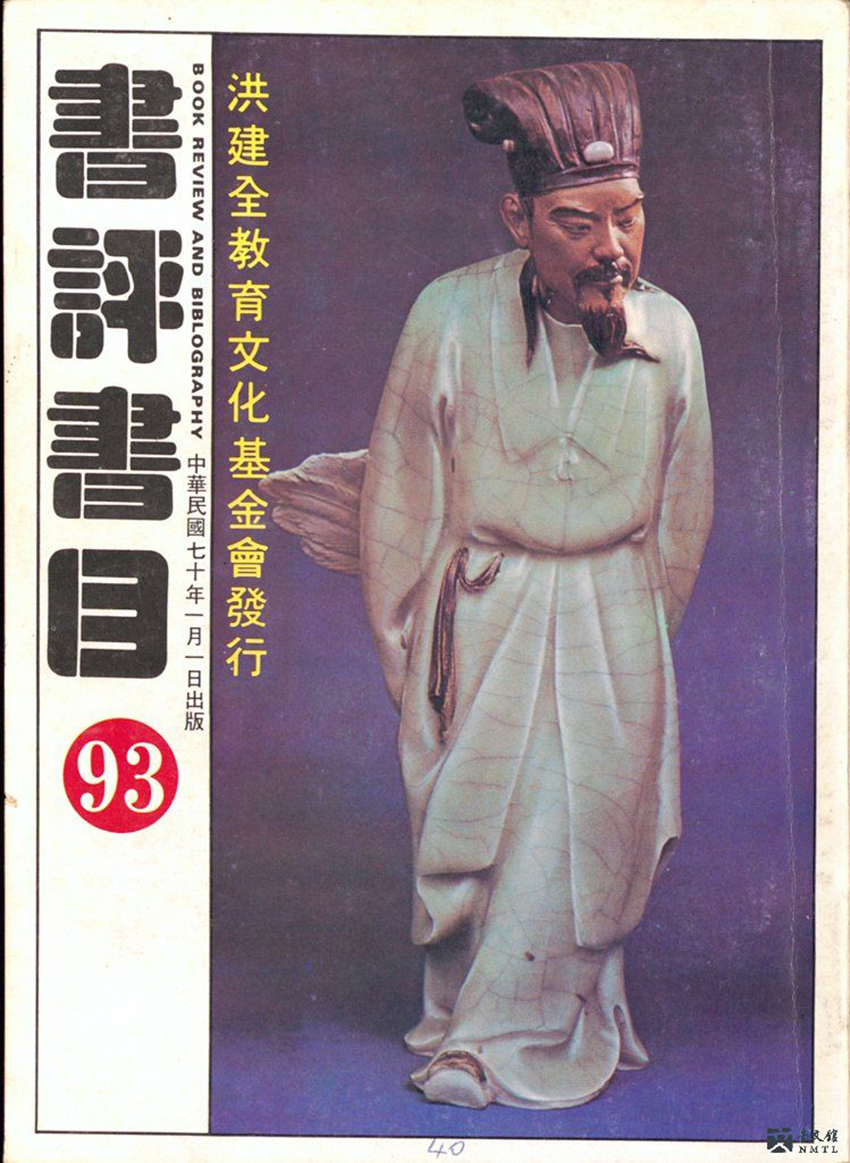
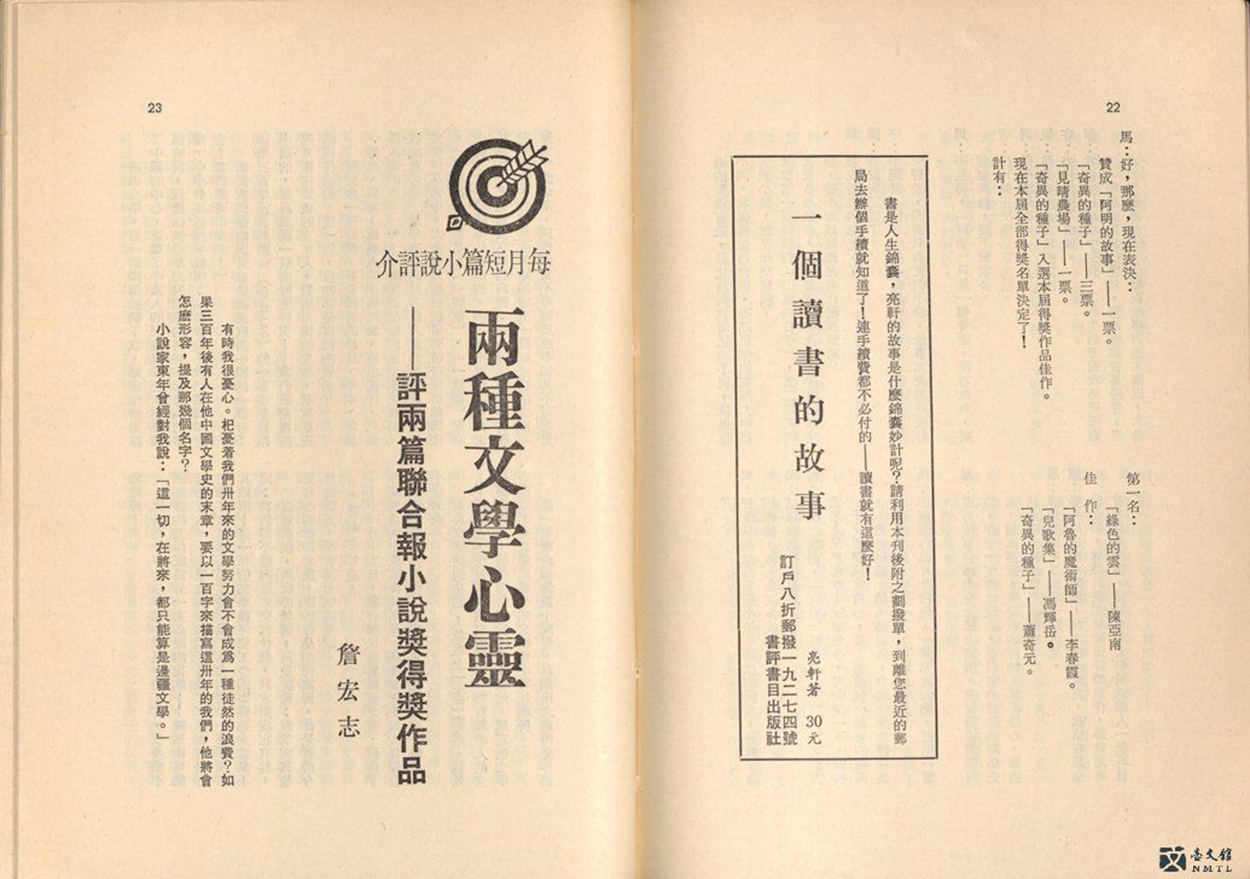
Hong-Zhi Zhan, "Two Kinds of Literary Minds: A Review of Two Novels Granted with the United Daily News Award" in REVIEWS & BIBLIOGRAPHY Issue 93
Founded by Hong's Foundation for Education & Culture in 1972, two thirds of the magazine were dedicated to book reviews, while the rest was bibliography. It was the first publication of book reviews in Taiwan after the war. The magazine provided literary criticism and preserved literary historical materials. A total of 100 issues were released. In 1981, Hong-Zhi Zhan submitted "Two Kinds of Literary Minds: A Review of Two Novels Granted with the United Daily News Award." In this article, Zhan questions whether Taiwanese literature is only at the margins of Chinese literature. His opinion led to a huge controversy in the literary scene. (Donated by Rui-Ming Lin, Collection of National Museum of Taiwan Literature)
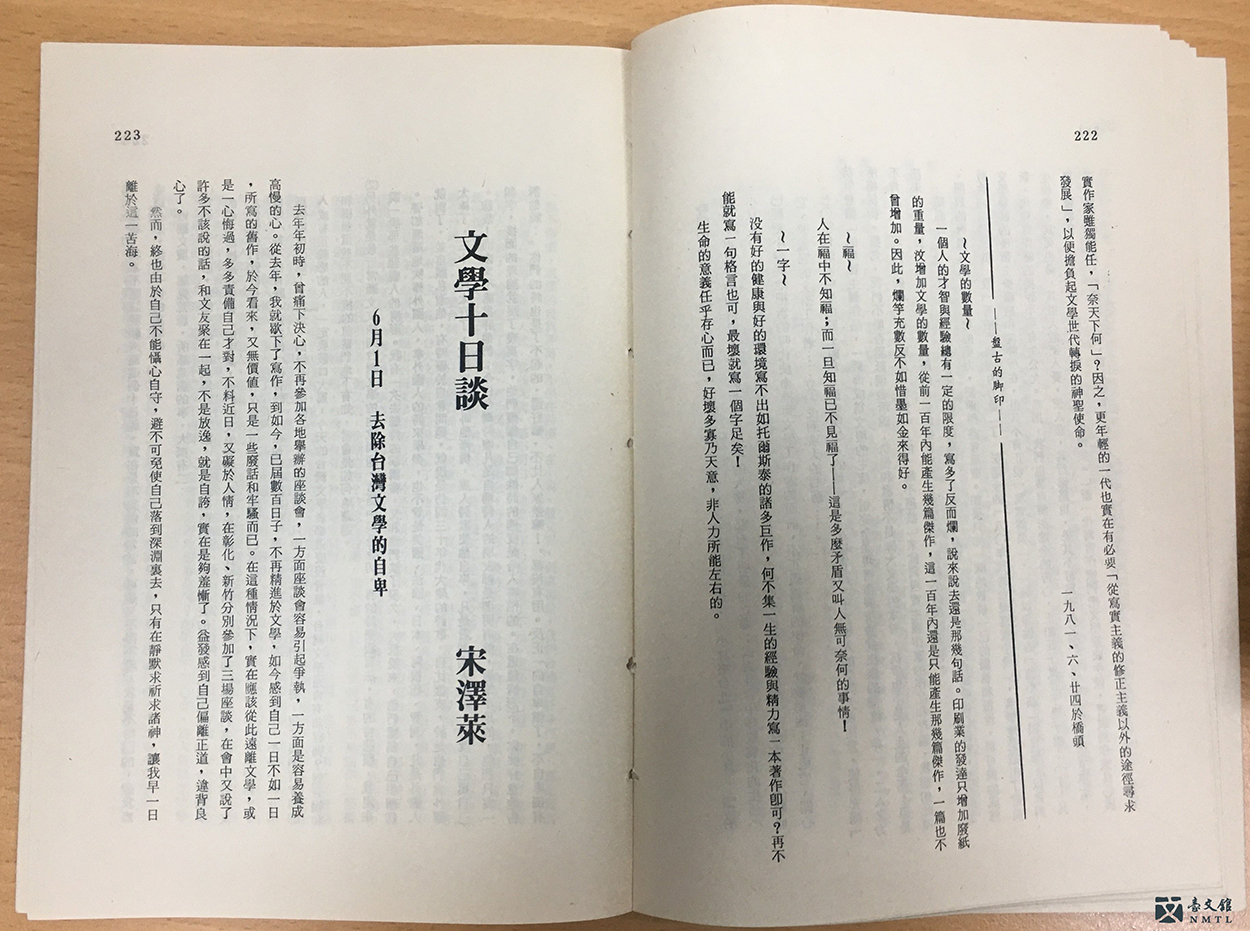
Ze-Lai Song, "Literary Decameron" in TAIWAN LITERATURE Issue 20, New Edition
Released in July 1981, Issue 20 of the new edition of TAIWAN LITERATURE was coordinated by Chao-Cheng Chung. For this issue, "Special Feature: Direction of Taiwanese Literature," a seminar on Hong-Zhi Zhan's "marginal literature statement" was held, inviting multiple writers to discuss the positioning of Taiwanese literature. The same issue also included Ze-Lai Song's "Literary Decameron," which puts forward his views about, and suggestions for, Taiwanese literature. It was the nativist writers' counterattack against "the marginal literature statement." (Collection of National Museum of Taiwan Literature)
